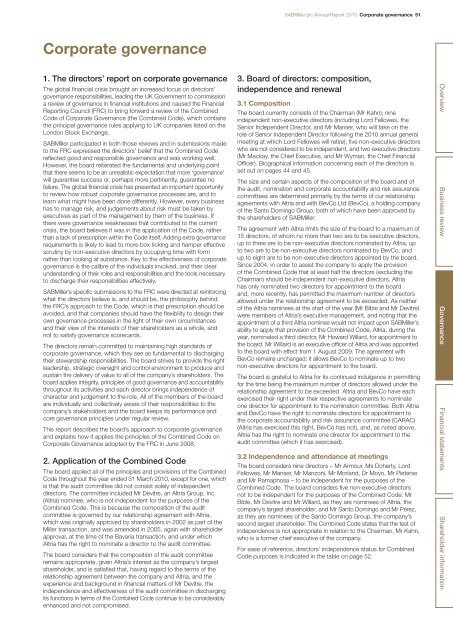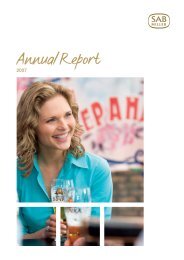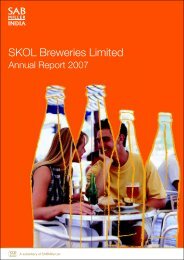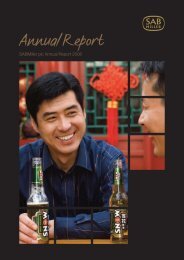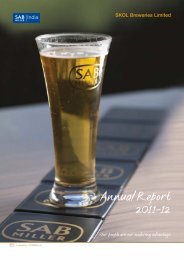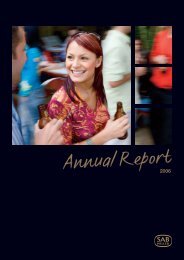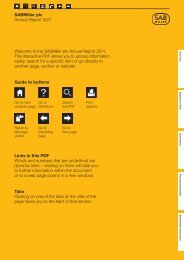Annual Report - SABMiller
Annual Report - SABMiller
Annual Report - SABMiller
- No tags were found...
Create successful ePaper yourself
Turn your PDF publications into a flip-book with our unique Google optimized e-Paper software.
<strong>SABMiller</strong> plc <strong>Annual</strong> <strong>Report</strong> 2010 Corporate governance 51Corporate governance1. The directors’ report on corporate governanceThe global financial crisis brought an increased focus on directors’governance responsibilities, leading the UK Government to commissiona review of governance in financial institutions and caused the Financial<strong>Report</strong>ing Council (FRC) to bring forward a review of the CombinedCode of Corporate Governance (the Combined Code), which containsthe principal governance rules applying to UK companies listed on theLondon Stock Exchange.<strong>SABMiller</strong> participated in both those reviews and in submissions madeto the FRC expressed the directors’ belief that the Combined Codereflected good and responsible governance and was working well.However, the board reiterated the fundamental and underlying pointthat there seems to be an unrealistic expectation that more ‘governance’will guarantee success or, perhaps more pertinently, guarantee nofailure. The global financial crisis has presented an important opportunityto review how robust corporate governance processes are, and tolearn what might have been done differently. However, every businesshas to manage risk, and judgements about risk must be taken byexecutives as part of the management by them of the business. Ifthere were governance weaknesses that contributed to the currentcrisis, the board believes it was in the application of the Code, ratherthan a lack of prescription within the Code itself. Adding extra governancerequirements is likely to lead to more box ticking and hamper effectivescrutiny by non-executive directors by occupying time with formrather than looking at substance. Key to the effectiveness of corporategovernance is the calibre of the individuals involved, and their clearunderstanding of their roles and responsibilities and the tools necessaryto discharge their responsibilities effectively.<strong>SABMiller</strong>’s specific submissions to the FRC were directed at reinforcingwhat the directors believe is, and should be, the philosophy behindthe FRC’s approach to the Code, which is that prescription should beavoided, and that companies should have the flexibility to design theirown governance processes in the light of their own circumstancesand their view of the interests of their shareholders as a whole, andnot to satisfy governance scorecards.The directors remain committed to maintaining high standards ofcorporate governance, which they see as fundamental to dischargingtheir stewardship responsibilities. The board strives to provide the rightleadership, strategic oversight and control environment to produce andsustain the delivery of value to all of the company’s shareholders. Theboard applies integrity, principles of good governance and accountabilitythroughout its activities and each director brings independence ofcharacter and judgement to the role. All of the members of the boardare individually and collectively aware of their responsibilities to thecompany’s stakeholders and the board keeps its performance andcore governance principles under regular review.This report describes the board’s approach to corporate governanceand explains how it applies the principles of the Combined Code onCorporate Governance adopted by the FRC in June 2008.2. Application of the Combined CodeThe board applied all of the principles and provisions of the CombinedCode throughout the year ended 31 March 2010, except for one, whichis that the audit committee did not consist solely of independentdirectors. The committee included Mr Devitre, an Altria Group, Inc.(Altria) nominee, who is not independent for the purposes of theCombined Code. This is because the composition of the auditcommittee is governed by our relationship agreement with Altria,which was originally approved by shareholders in 2002 as part of theMiller transaction, and was amended in 2005, again with shareholderapproval, at the time of the Bavaria transaction, and under whichAltria has the right to nominate a director to the audit committee.The board considers that the composition of the audit committeeremains appropriate, given Altria’s interest as the company’s largestshareholder, and is satisfied that, having regard to the terms of therelationship agreement between the company and Altria, and theexperience and background in financial matters of Mr Devitre, theindependence and effectiveness of the audit committee in dischargingits functions in terms of the Combined Code continue to be considerablyenhanced and not compromised.3. Board of directors: composition,independence and renewal3.1 CompositionThe board currently consists of the Chairman (Mr Kahn); nineindependent non-executive directors (including Lord Fellowes, theSenior Independent Director, and Mr Manser, who will take on therole of Senior Independent Director following the 2010 annual generalmeeting at which Lord Fellowes will retire); five non-executive directorswho are not considered to be independent, and two executive directors(Mr Mackay, the Chief Executive, and Mr Wyman, the Chief FinancialOfficer). Biographical information concerning each of the directors isset out on pages 44 and 45.The size and certain aspects of the composition of the board and ofthe audit, nomination and corporate accountability and risk assurancecommittees are determined primarily by the terms of our relationshipagreements with Altria and with BevCo Ltd (BevCo), a holding companyof the Santo Domingo Group, both of which have been approved bythe shareholders of <strong>SABMiller</strong>.The agreement with Altria limits the size of the board to a maximum of15 directors, of whom no more than two are to be executive directors,up to three are to be non-executive directors nominated by Altria, upto two are to be non-executive directors nominated by BevCo, andup to eight are to be non-executive directors appointed by the board.Since 2004, in order to assist the company to apply the provisionof the Combined Code that at least half the directors (excluding theChairman) should be independent non-executive directors, Altriahas only nominated two directors for appointment to the boardand, more recently, has permitted the maximum number of directorsallowed under the relationship agreement to be exceeded. As neitherof the Altria nominees at the start of the year (Mr Bible and Mr Devitre)were members of Altria’s executive management, and noting that theappointment of a third Altria nominee would not impact upon <strong>SABMiller</strong>’sability to apply that provision of the Combined Code, Altria, during theyear, nominated a third director, Mr Howard Willard, for appointment tothe board. Mr Willard is an executive officer of Altria and was appointedto the board with effect from 1 August 2009. The agreement withBevCo remains unchanged: it allows BevCo to nominate up to twonon-executive directors for appointment to the board.The board is grateful to Altria for its continued indulgence in permittingfor the time being the maximum number of directors allowed under therelationship agreement to be exceeded. Altria and BevCo have eachexercised their right under their respective agreements to nominateone director for appointment to the nomination committee. Both Altriaand BevCo have the right to nominate directors for appointment tothe corporate accountability and risk assurance committee (CARAC)(Altria has exercised this right, BevCo has not), and, as noted above,Altria has the right to nominate one director for appointment to theaudit committee (which it has exercised).3.2 Independence and attendance at meetingsThe board considers nine directors – Mr Armour, Ms Doherty, LordFellowes, Mr Manser, Mr Manzoni, Mr Morland, Dr Moyo, Mr Pieterseand Mr Ramaphosa – to be independent for the purposes of theCombined Code. The board considers five non-executive directorsnot to be independent for the purposes of the Combined Code: MrBible, Mr Devitre and Mr Willard, as they are nominees of Altria, thecompany’s largest shareholder; and Mr Santo Domingo and Mr Pérez,as they are nominees of the Santo Domingo Group, the company’ssecond largest shareholder. The Combined Code states that the test ofindependence is not appropriate in relation to the Chairman, Mr Kahn,who is a former chief executive of the company.For ease of reference, directors’ independence status for CombinedCode purposes is indicated in the table on page 52.Overview Business review Governance Financial statements Shareholder information


